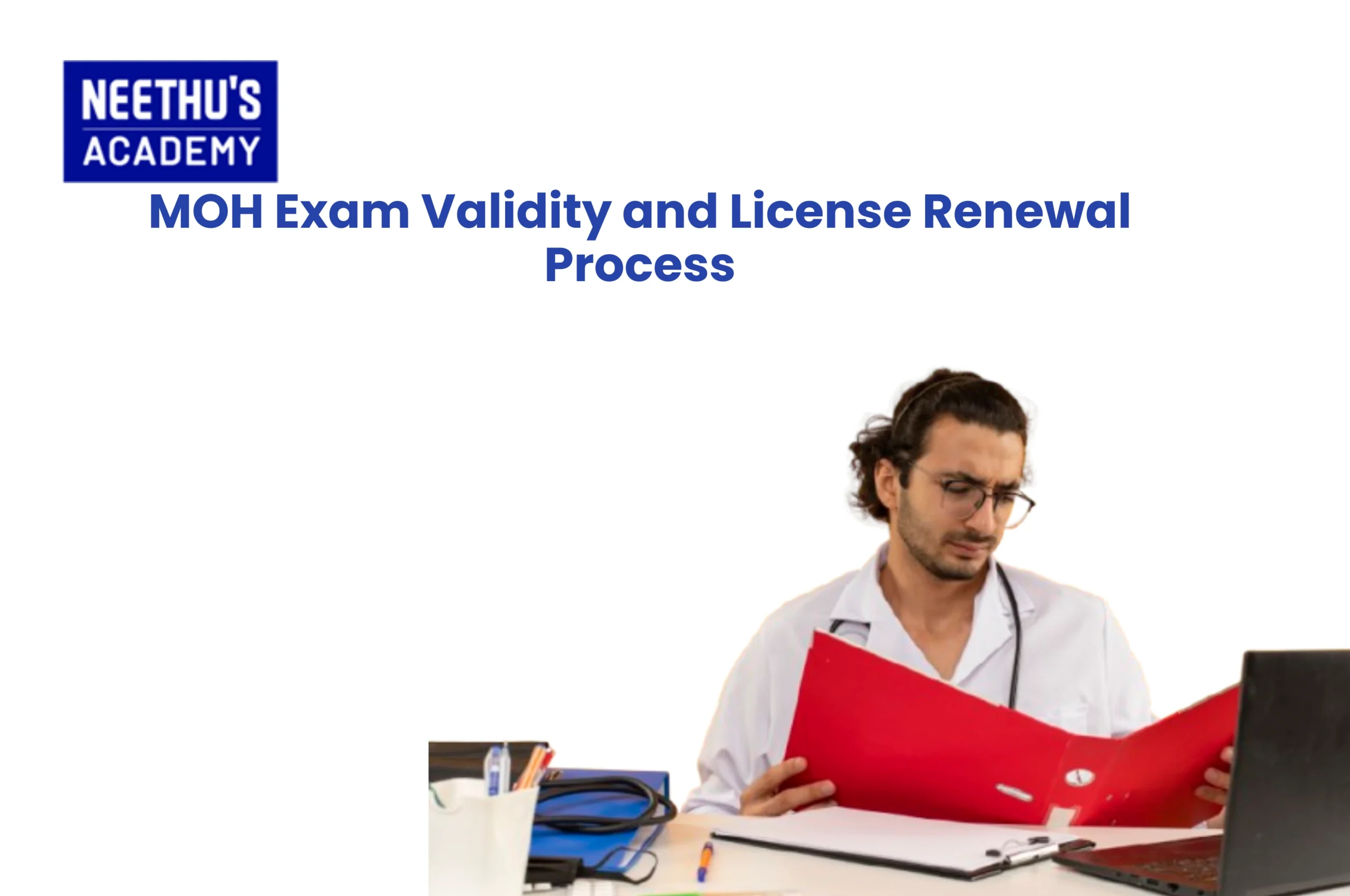Imagine you are running out of time and still have questions to complete! That would be the worst-case scenario while taking a…

A Complete Guide on How to Prepare for the MOH Exam
If you’re a healthcare professional looking to build a career in the United Arab Emirates (UAE), passing the Ministry of Health (MOH) exam is a crucial milestone. Whether you’re a nurse, doctor, pharmacist, or another medical professional, this certification is your gateway to practicing in the UAE’s diverse and rapidly growing healthcare sector. The MOH exam is designed to ensure that all healthcare workers meet the rigorous standards expected by the UAE, making it a key requirement for anyone looking to work in this region.
Preparing for the MOH exam can feel overwhelming, especially when you’re juggling work, study, and personal commitments. But with the right guidance and a well-structured study plan, you can approach this exam with confidence. Whether you’re just starting your preparation or looking for the final push to get exam-ready, this blog will support you every step of the way. Let’s dive in and set you on the path to success!
Understanding MOH Exam
It measures the level of knowledge, skills, and abilities relevant for healthcare professionals to become considered as qualified providers of quality care in the UAE. The content, structure, and the form of the test may also differ based on the professions involved, such as nurses, doctors, pharmacists, and other personnel.
For nurses, the MOH exam encompasses the following content areas:
Medical-Surgical Nursing: This part examines the performance of patient care in the surgical and medical settings, including pre-and postoperative care.
Pharmacology: The administration of medications requires the use of information regarding medication interaction and the treatment of medication side effects.
Maternal and Child Health: This part examines the performance in the care of pregnant women, newborns, and children within the gestation, natal, and postnatal periods.
Community Health Nursing: This area covers basic health principles, applied epidemiology, and targeted care within the community.
The question format commonly consists of multiple-choice questions that assess theoretical knowledge and application. In some branches of the exam, there may be a question paper based on application/ case scenarios format, practical evaluation, or both, according to the selected healthcare occupation.
Benefits of MOH Certification
There are a number of advantages to receiving an MOH certification, professionally and personally. They are:
Eligibility to work in the UAE: Any healthcare professional aspiring to work in the UAE, with the exception of the emirates Abu Dhabi and Dubai, must possess the MOH certification.
Enhanced Career Prospects: Having an MOH certification will give you a better advantage in job opportunities in the most reputable healthcare facilities all over the UAE.
Professional Growth: Certification certainly adds to your knowledge and skill and helps in meeting the high standards required by the UAE healthcare system.
Higher Remuneration: Since their qualifications are well known to meet the rigorous demands of the job, there is usually a larger propensity for certified professionals to obtain higher salaries.
Flexibility and Mobility: MOH certification is usually recognized across several emirates, so you have more flexibility to work in different locations within the UAE.
Access to Continuing Education: With MOH certification, you may gain access to exclusive training programs, workshops, and seminars that contribute to ongoing professional development.
Networking Opportunities: Being part of the MOH-certified community allows you to connect with other healthcare professionals, facilitating knowledge exchange and career advancement.
Preparation Tips for the MOH Exam
Review the Syllabus and Exam Format
First, and foremost, in preparing for the internal exam of DHCC, pay keen attention to the syllabus recommended by the Ministry of Health. For you to strategize your studies, you need to know which topics and subjects will be examined. Pay special attention to the types of questions, the number of questions, and the topics asked. Knowing the outline of the syllabus will assist you in managing your time well and will have reduced your anxiety during the day of the paper.
Study the Material
Once you’ve grasped the syllabus, it’s crucial to establish a study plan that suits your needs. Create a manageable study schedule, allocating specific times for each subject to avoid feeling overwhelmed. Break down the syllabus into smaller topics to enhance retention and build a solid knowledge base. Supplement your study with various resources such as online courses, practice questions, and flashcards. Employ active learning techniques like summarizing in your own words, using diagrams, and teaching others to reinforce your understanding. Additionally, consider studying in a group to gain diverse perspectives and boost motivation.
Take Mock Tests
Mock tests constitute an integral part of your overall MOH exam preparation. They familiarize you with the pattern of exams and assess those areas on which you would need to work hard, thereby inculcating confidence in you. Start your mock tests early to allow ample time to address any weaknesses and refine your test-taking strategies. Simulate real exam conditions by timing yourself and choosing a quiet environment, which helps with time management and reduces stress. After each mock test, carefully review your answers to identify and understand your mistakes, focusing on these areas for improvement. Track your progress by recording your scores, adjusting your study plan based on performance trends, and concentrating on areas with the most potential for improvement.
Revise and Relax
In the final stretch before your exam, balancing revision with relaxation is crucial. Focus your revision on key topics where you need the most improvement, and use summary notes or flashcards for quick reviews of important concepts. Practice relaxation techniques like deep breathing or light exercise to manage stress and maintain clarity. Ensure you get adequate rest, particularly the night before the exam, as a well-rested mind will perform better under pressure.
Proper study materials
For effective MOH exam preparation, it’s essential to choose the right study materials. Start with textbooks such as Brunner & Suddarth’s Textbook of Medical-Surgical Nursing and Pharmacology for Nursing Care. Complement this with online courses from platforms like Coursera and Udemy, or specialized MOH prep sites, which provide structured lessons and interactive content. Utilize MOH exam study guides for practice questions and test strategies. Flashcards from apps like Quizlet are great for quick reviews, and mobile apps designed for MOH prep offer daily questions and progress tracking features.
About MOH Practice Tests
Practice tests are a vital part of your preparation strategy. They provide valuable insights into the exam format, question types, and your own readiness. Here’s why you should incorporate practice tests into your study plan:
- Simulate Exam Conditions: Practice tests mimic the actual exam environment, helping you get used to the pressure and time constraints you’ll face on the day of the test.
- Identify Knowledge Gaps: By taking practice tests, you can identify specific areas where you need to improve your understanding or recall.
- Build Confidence: Familiarity with the exam format through regular practice helps reduce anxiety and build confidence, making you more comfortable with the material and the test-taking process.
- Improve Time Management: Practice tests teach you how to pace yourself during the exam, ensuring that you can complete all questions within the allotted time without rushing or leaving questions unanswered.
- Access Detailed Explanations: Many practice tests come with detailed explanations for each question, helping you understand the rationale behind the correct answers and learn from your mistakes.
To maximize the benefits of practice tests, take them under timed conditions and review your answers thoroughly. Use the results to fine-tune your study plan and focus on areas that need improvement.
To wrap things up
In summary, preparing for your exam effectively involves a mix of strategic studying and smart relaxation. Start early, breaking down your syllabus into manageable chunks, and supplement your learning with diverse resources and active techniques. Incorporate regular mock tests to track your progress and fine-tune your approach. As the exam approaches, prioritize key topics, use summary notes for a final review, and practice relaxation methods to stay calm. By striking the right balance, you’ll be well-prepared and ready to tackle your exam with confidence. Good luck!
Related Blogs
- All Posts
- OET
In case you are immigrating to Canada or looking for higher studies in the French-speaking parts of the nation, then the TCF…
Feeling a bit overwhelmed about the OSCE? You're not alone! The Objective Structured Clinical Examination is a big step in your medical…
Course Enquiry
Latest Posts
- All Posts
- canada
- CBT
- DHA
- French
- GENERAL
- German
- Haad
- IELTS
- IQN NEW ZEALAND
- MOH
- NCLEX-RN
- NHRA
- OET
- OSCE
- Pearson Vue
- PROMETRIC
- PTE
- TOEFL
- Back
- NCLEX - NGN
- Back
- OET FOR PHYSIOTHERAPIST
- OET FOR PHARMACIST
- OET FOR DOCTORS



Frequently Asked Questions
To prepare for the MOH exam, start by understanding the exam syllabus and format. Create a study plan that covers all topics systematically and stick to it. Use a variety of resources, such as textbooks, online courses, and practice questions. Regularly review key concepts and take mock tests to gauge your progress and improve your time management.
Effective study methods include breaking down the syllabus into manageable sections and focusing on one topic at a time. Utilize multiple study resources, such as guides and flashcards, and practice actively by summarizing information and taking practice exams. Consistent review and testing yourself under timed conditions will enhance your understanding and retention.
To clear the MOH exam, focus on mastering the core subjects in the syllabus. Regularly practice with sample questions and mock tests to familiarize yourself with the exam format and improve your performance. Ensure you follow a structured study plan, stay organized, and get plenty of rest before the exam to stay sharp and confident on test day.
